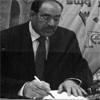Government allies see gains in Iraqi elections
Hurriyet Daily News with wires

refid:10904241 ilişkili resim dosyası
Allies of Iraq's U.S.-backed prime minister appeared yesterday to have made gains in the provincial elections, rewarding groups credited with reining in insurgents and militias, according to unofficial projections.Initial results from Saturday's landmark voting are not expected for days. But reports by Iraqi media and interviews by The Associated Press suggest candidates backing Prime Minister Nouri al-Maliki had strong showings in the crucial Shiite heartland in southern Iraq.
If the indications prove true, it would strengthen al-Maliki's hand ahead of national elections later this year and reflect a shift away from the more religious parties dominating the country.
Obama hails polls
U.S. President Barack Obama hailed the poll as an important step toward Iraqis taking responsibility for their future. "I congratulate the people of Iraq on holding significant provincial elections today," he said in a statement, according a report by Reuters.
Nationwide turnout was 51 percent, said Faraj al-Haidari, chairman of the election commission. It ranged from 40 percent in the Sunni-dominated Anbar province in western Iraq to 65 percent in the Salahuddin province, which includes the hometown of Saddam Hussein.
As Hürriyet Daily News & Economic Review went to press yesterday, final figures were not yet ready for the Baghdad area, but al-Haidari said initial reports placed it at about 40 percent.
"So far, so good. The significance? Historic," U.N. Special Representative Staffan de Mistura told Reuters at a polling station in a Baghdad school.
Al-Maliki's supporters appeared to hold the lead in many areas of the south, including the key city of Basra and the Shiite spiritual center of Najaf, according to Iraq's private Al-Sharqiya television. The trend was supported by voter comments in Basra and other areas.
Many voters praised last year's government-backed crackdown that broke the Shiite militia control in Basra and other areas.
"Al-Maliki ended the militiamen's reign of terror," said Faisal Hamadi, 58, after voting in Basra. "For this he deserves our vote."
Gains by al-Maliki's allies would come directly at the expense of the biggest Shiite party, the Supreme Islamic Iraqi Council, which is a senior partner in the government but has hinted it could make a bid to take the leadership in national elections later this year.
No serious violence
The Supreme Council has a strong base among Shiite religious authorities - who are seen with suspicion by some Iraqis because of perceived ties to neighboring Iran and claims they fueled sectarian violence.
In the western Anbar province, Sunni tribesmen also are hoping to ride public support for their role in fighting insurgents.
The so-called Awakening Councils, which rose up against al-Qaeda in Iraq and other factions in late 2006, are credited with leading a turning point of the war. The tribal leaders are now seeking to capture seats on the provincial councils, which control spending, jobs and other important regional influence.
Sunnis widely boycotted the last provincial elections in 2005 because of fears of reprisals from insurgents and opposition to the U.S. occupation. The elections took place without serious violence and were hailed as a major achievement by Iraqi officials seeking a return to stability nearly six years after the U.S.-led invasion in the country.
But there were widespread reports of eligible voters left off ballot lists. Election officials said they would investigate the claims.
Voting took place in 14 of Iraq's 18 provinces. Elections are planned later in the Kurdish autonomous region and were indefinitely postponed in the area around oil-rich Kirkuk, where ethnic groups could not agree on a power-sharing formula.
















